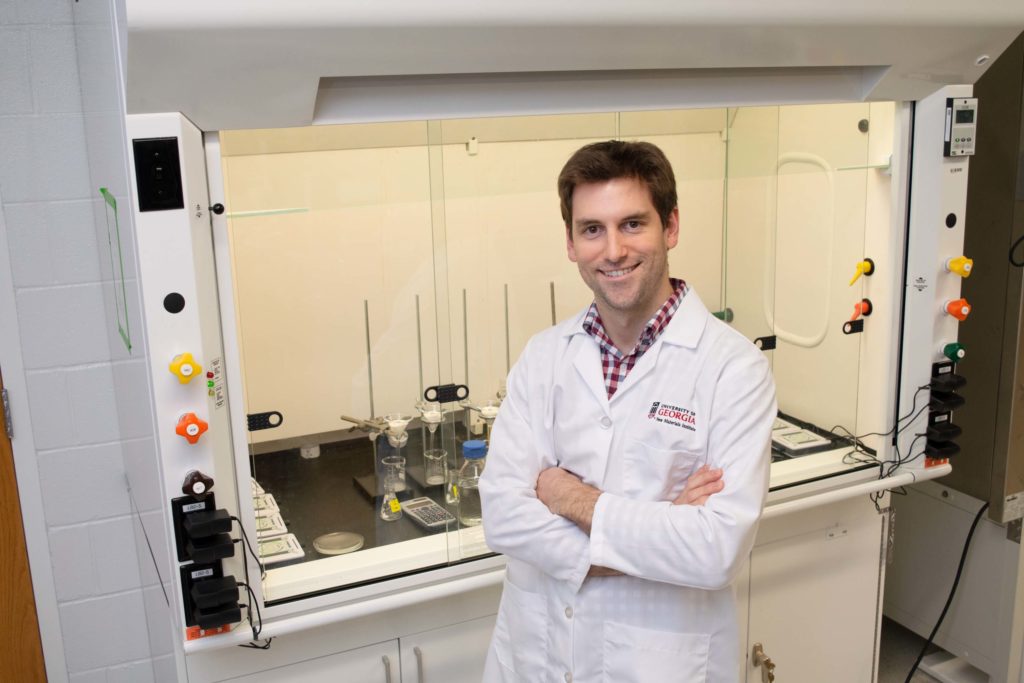UGA scientist leads effort to help flexible films fully transition to compostable technologies

Evan White, of the UGA New Materials Institute, is leading an initiative to establish a nonprofit organization to raise money for research and development of compostable technologies for the flexible films industry to help facilitate the industry’s transition toward greater sustainability in packaging for consumer goods and food packaging.
The initiative, “Crowdfunding for Research & Development of New Compostable Materials,” is one of nine incubation projects resulting from a virtual workshop held throughout 2020 involving White and more than 80 experts—including polymer scientists, resin producers, retailers, waste managers, soil experts and other industry professionals. The Redesigning Flexible Films Innovation Workshop participants included representatives from the UGA New Materials Institute, Dr. Bronner’s, Eco-Cycle, Mars, New Hope Network, PepsiCo, Ben & Jerry’s, and Amy’s Kitchen, among others.
The result of their efforts are broadly outlined in a white paper titled “Uncovering the Next Innovation Curve in Sustainable Packaging.” The white paper creates a framework to move industry toward zero-waste packaging by transitioning away from traditional plastic flexible films, materials that have been a rapidly growing packaging format with no end-of-life option. Flexible films currently utilized by industry include bags, wraps, multilayer packaging, air pouches, and most packaging used for food. Benefits of flexible packaging include the delivery of safe and affordable food to consumers, and reduction of emissions from transportation and food waste. Despite these benefits, the flexible films currently in use are the most environmentally deleterious form of packaging and have a limited recycling future—and, therein lies the paradox. In his role as a workshop participant, White, who is director of the New Material Institute’s Bioseniatic℠ Laboratory, advocated for compostable technologies as replacement options for these materials.
“The problem with flexible films currently in use is their end-of-life scenario,” explained White. “They are not recycled because they easily gum up the recycling sorters and grinders. Their light weight means the films have no value to recyclers, and flexible films are often contaminated with food residue, which bars them from recycling. This type of light-weight packaging is carried easily by the wind and therefore is widely distributed into the environment. These films are used by industry because they are inexpensive. Industry needs an inexpensive, responsibly-sourced alternative to this type of commonly used plastic.”
The non-profit fundraising arm that White and his team will create will be an independent entity. White is currently forming a board of directors and creating organizational bylaws. More details will be released later this year. The goal is to publish advances that benefit the flexible film industry, and, to raise funds for research and development aimed at tackling three key lingering problems with multilayer films and the flexible packaging industry: compostable energy curable varnishes; compostable inks; and new barrier layers to replace aluminum metalized packaging currently used in chip bags and other single-use applications. Until now, certification agencies have tolerated minimal levels of these materials in packaging, but this acceptance will be gradually phased out as industry moves toward sustainability goals set for 2030.
The virtual workshop was produced by RCD Packaging Innovation, a supply and innovation firm that specializes in packaging solutions to eliminate waste and care for our planet; support was provided by OSC. To download a free copy of the white paper, click here.
